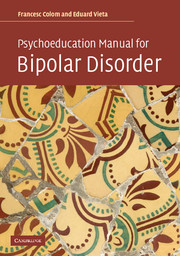Book contents
- Frontmatter
- Contents
- Foreword
- Preface
- Part 1 Clinical, diagnostic, and therapeutic aspects of bipolar disorders
- Introduction
- Bipolar disorders through history
- Diagnosis and classification
- Psychological interventions in bipolar disorders
- Part 2 Concept and methodology of psychoeducation
- Part 3 Psychoeducation program: sessions and contents
- Bibliography
- Index
Introduction
from Part 1 - Clinical, diagnostic, and therapeutic aspects of bipolar disorders
Published online by Cambridge University Press: 06 January 2010
- Frontmatter
- Contents
- Foreword
- Preface
- Part 1 Clinical, diagnostic, and therapeutic aspects of bipolar disorders
- Introduction
- Bipolar disorders through history
- Diagnosis and classification
- Psychological interventions in bipolar disorders
- Part 2 Concept and methodology of psychoeducation
- Part 3 Psychoeducation program: sessions and contents
- Bibliography
- Index
Summary
Bipolar disorders, classically known as “manic–depressive psychosis, ” is a serious, chronic, and relapsing mental disorder. Despite the growing efficacy of available pharmacological tools, bipolar-affective disorders have continued to be a significant source of morbidity and mortality, doing serious harm to the quality of life of sufferers. They are the sixth cause of disability worldwide (López and Murray, 1998) and, serious and chronic as they are, represent a heavy financial and social burden – both direct (hospitalizations and consumption of medical resources) and indirect (constant days missed from work and loss of productivity) (Wyatt and Henter, 1995; Goetzel et al., 2003).
The incidence of bipolar disorders amounts to approximately 4% of the adult population (Hirschfeld et al., 2003), but may reach 6. 5% of the population at large if minor and atypical forms are included (Angst, 1995). The consequences of the disorder and its subsequent relapses for the individual and for family members, combined with the high risk of mortality by suicide (Vieta et al., 1992, 1997a, b, c; Tsai et al., 2002) suggest that a multiple therapeutic effort must be made, going beyond while at the same time supportive of drug therapy.
- Type
- Chapter
- Information
- Publisher: Cambridge University PressPrint publication year: 2006



